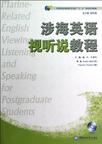涉海英语视听说教程
出版时间:2012-8 出版社:中国海洋大学出版社 作者:杨红,王智红 主编 页数:220 字数:350000
内容概要
本教程共10个单元,10个主题,涵盖海洋生物、海洋食品与安全、海水养殖、海洋法、海洋经济及海洋污染等社会热点问题。每单元由主题视听说、学术英语报告和新闻英语听力技巧三大部分组成。其主要特点:选材真实,内容丰富;任务导向,交际为本;编排新颖,实用性强。其编写基于研究生英语教学的改革新趋势,选取与海洋专业相关的视听材料,借助形式多样的练习,在全面提高学生英语听说能力的基础上,使学生掌握相关的海洋知识,提高学术英语交流的能力。
书籍目录
Module 1 0ceansJ
Learning objectives
Part I Theme.related Listening,Viewing and Speaking
Part lI Academic Presentation
Part IU Listening Skills for News English
Module 2 Endangerde Marine Animals
Learning objectives
Part I Theme.related Listening,Viewing and Speaking
Part lI Academic Presentation
Part IU Listening Skills for News English
Module 3 Marine Medicine
Learning objectives
Part I Theme.related Listening,Viewing and Speaking
Part lI Academic Presentation
Part IU Listening Skills for News English
Module 4 Marine Law
Learning objectives
Part I Theme.related Listening,Viewing and Speaking
Part lI Academic Presentation
Part IU Listening Skills for News English
Module 5 Aquaculture
Learning objectives
Part I Theme.related Listening,Viewing and Speaking
Part lI Academic Presentation
Part IU Listening Skills for News English
Module 6 Seafood Security
Learning objectives
Part I Theme.related Listening,Viewing and Speaking
Part lI Academic Presentation
Part IU Listening Skills for News English
Module 7 Maring Tourism
Learning objectives
Part I Theme.related Listening,Viewing and Speaking
Part lI Academic Presentation
Part IU Listening Skills for News English
Module 8 Marine Econimy
Learning objectives
Part I Theme.related Listening,Viewing and Speaking
Part lI Academic Presentation
Part IU Listening Skills for News English
Module 9 Marine Pollurion
Learning objectives
Part I Theme.related Listening,Viewing and Speaking
Part lI Academic Presentation
Part IU Listening Skills for News English
Module 10 New Technology Used In The Marine Field
Learning objectives
Part I Theme.related Listening,Viewing and Speaking
Part lI Academic Presentation
Part IU Listening Skills for News English
Appendix Keys Scripts
章节摘录
6. Common property regimes can be effective at controlling access to the resource. Most common property regimes are based upon someform of access control and some form of institutional design to regulate use and to minimize the subtractability problem. The literature on common property regimes recognizes that solutions exist through three basic kinds of property rights regimes:l) state property or state governance indicates that rights to the resource are controlled exclusively by government agencies on behalf of all the citizens,2) communal property or common property means that the resource is held by an identifiable community of users who can exclude others and regulate their own use, and 3) .private property refers to a situation in which an individual or a corporate body has the right to exclude others and regulate the use of the resources. 7.Common property regimes as collective resource management systems have been shown to develop when a group of individuals are highly dependent on a resource (s) and when the availability of the resource (s) is uncertain or limited. If the resource problem is repeatedly experienced, such as low yields or no catch, and if it exists within a single community of users, the fishermen are likely to develop a collective institutional arrangement (rights and rules) to deal with the problem. In the face of uncertainty in resource availability, group members are willing to trade off some benefit from individual use of the resource, for the collective assurance that the resource will be used in a more equitable and sustainable manner. Institutions, through rules, provide incentives for the group members to take certain actions to achieve the desired outcome. The development of institutional arrangements requires an investment of time by the members of the community. Coordination and informational meetings are initial aspects of building institutions. The transaction process of developing institutions will have costs. For common property regimes, these costs are part of the collective decision-making process. 8.As Jentoft put it, "how then is co-management to be distinguished from other common property management systems, such as government regulation or community-initiated regulation?" The answer is that comanagement is a middle course between pure state property and pure communal property regimes. The three property rights regimes mentioned above (plus the open access regime or the absence of property rights) are ideal, analytical types-they do not exist in the real world. Rather, resources tend to be held in overlapping combinations of these four regimes. Strictly speaking, pure communal property systems and community-based coastal resource management (CBCRM) are always embedded in state property systems and derive their strength from them. Co-management may involve the recognition and legitimization of traditional or customary local-level manage- ment systems. A certain degree of community-based resource management may be a part of co-management. 9.Fishermen's ability to organize for collective action has a number of prerequisites, essentially involving the question of local institutional arrangements. Not all groups of fishermen have appropriate local institutional arrangements. In such cases, any co-management initiative will start with institution-building. The establishment and suc cessful operation of fisheries co-management can be a complex, longterm, and costly process. The costs for individuals to participate in co-management (time and money) may outweigh the expected benefits. Community organizing, for example, can take from three to five years before a self-sufficient organization is in place, on the basis of cases in the Philippines, and five to ten years on the basis of a case in St. Lucia, West Indies. ……
媒体关注与评论
大学英语不能再重复讲授句型、语法、词汇,而应过渡到内容教学,走专门用途英语(ESP)和学术英语(EAP)之路。这既符合语言是文化和知识的载体的观点,又符合用语言教学带动学生智力和认知发展的要求。我看过《涉海英语》各册的内容目录,的确选材新颖,体裁多样,内容丰富,信息量大;课后练习也有新意。希望看到更多专业编出自己的教材,同时尽快开始培训相关专业的英语教师。 ——我国著名外语教育专家、博士生导师、北京外国语大学 刘润清教授 高校非英语专业的研究生英语教学应以提高学生在所学专业领域的学术英语听说读写译能力为首要目标,也就是说研究生层次的英语必须是与具体学科对接的特色鲜明的专门用途英语(ESP),而不是打遍所有学科的一门“公共”英语(EGP)。《涉海英语》系列教材在我国高校ESP教学领域进行了卓有成效的探索,为推动研究生英语教学改革作出了贡献。 ——中国专门用途英语专业委员会会长、博士生导师、北京外国语大学 孙有中教授 我国非英语专业的外语教学必须走培养学生直接使用英语从事科研和工作的能力的道路,《涉海英语》这套研究生教材以学科内容为依托,训练学生学术英语能力,代表了我国高校非英语专业外语教学的方向。 ——教育部大学外语教学指导委员会副主任委员、博士生导师、复旦大学 蔡基刚教授 全国涉海高校研究生英语系列教材充分结合研究生的自身特点,旗帜鲜明地主张以学科内容为主导的教学,教材内容密切结合研究生的专业,以培养在读研究生的学术英语水平为编写宗旨。当前大学英语正经历一场新的改革热潮,这一改革的核心内容是把大学英语教学定位到学术英语,本系列教材的问世见证了这一改革潮流的深入人心。 ——中国教育语言学研究会会长、博士生导师、上海交通大学 俞理明教授
编辑推荐
杨红、王智红、杨连瑞主编的《涉海英语视听说教程》以任务为驱动,每个单元为一个主题,通过相关的视听材料及多样化的练习形式,对学生进行知识构建。口语练习的编排强化视听说的有机融合。本教程能有效操练学生的语言输出技能,激发学生的学习兴趣和动力,全面提高其英语听说应用能力。
图书封面
评论、评分、阅读与下载
用户评论 (总计2条)
- 不是要考试 才不买
- 很有用,帮助极大。
